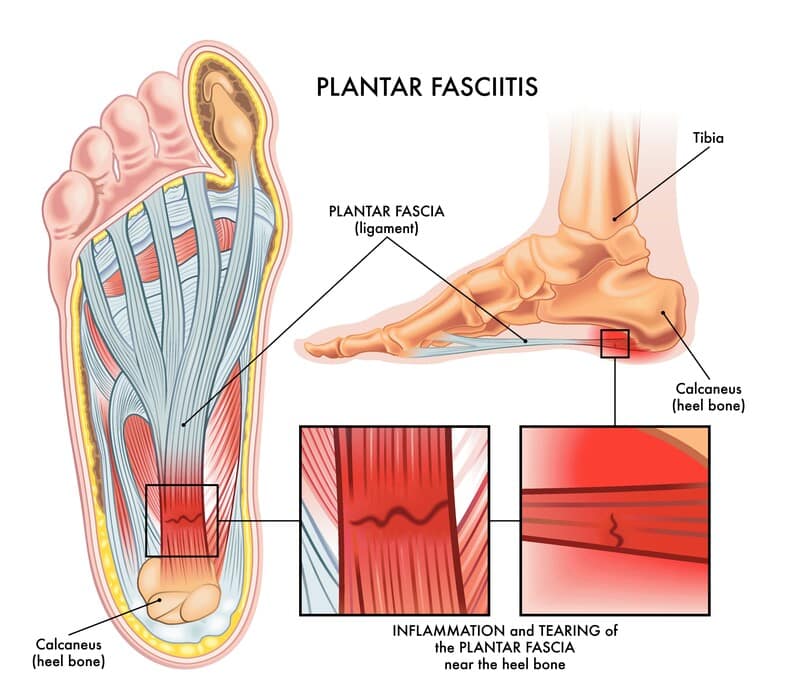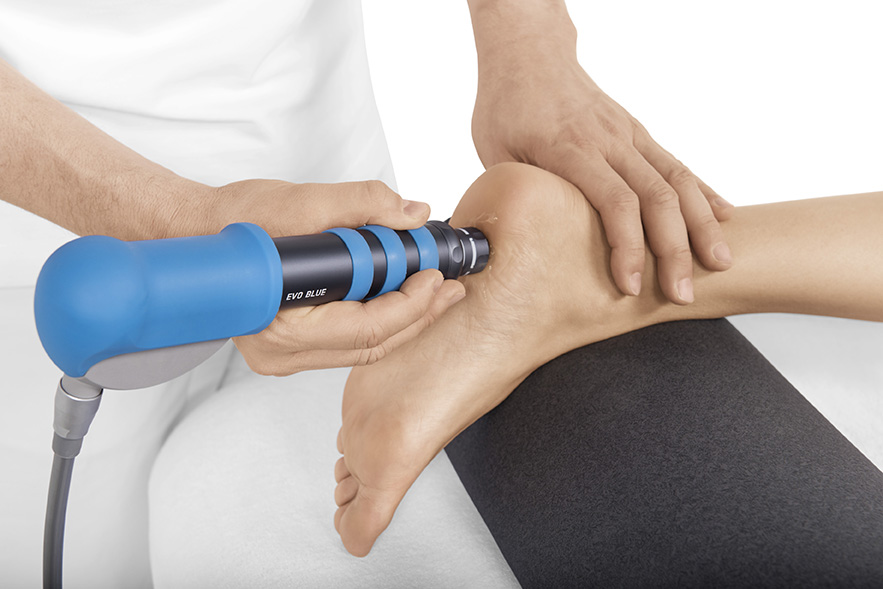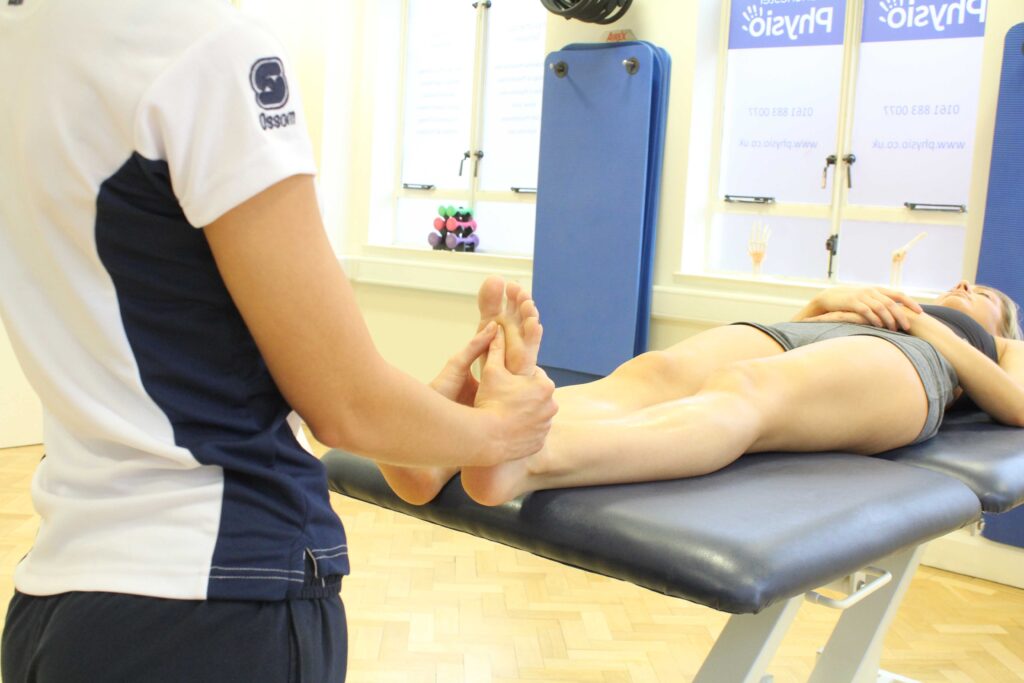Addressing Plantar Fasciitis and Heel Pain
Plantar fasciitis is a prevalent foot condition causing discomfort in the heel and arch, most noticeable during initial steps in the morning or after extended rest. The plantar fascia, a thick, durable band of tissue, supports the foot’s arch, stretching like a bowstring to absorb heel impact. Its limited flexibility, however, makes it susceptible to micro-tears from repetitive stress, such as running, leading to inflammation and pain. Poor circulation in the fascia slows natural healing, worsening symptoms. At Elite Performance Therapy, we deliver specialised sports therapy to relieve pain, enhance foot function, and restore mobility for those with plantar fasciitis.

Triggers of Plantar Fasciitis
Plantar fasciitis results from repetitive strain or biomechanical factors. Common triggers include:
- Repetitive Stress: Activities like running or prolonged standing overload the fascia, causing micro-tears.
- Inadequate Footwear: Shoes lacking arch support or cushioning increase fascia strain.
- Tight Calf Muscles: Limited flexibility in the calves or Achilles tendon pulls on the fascia.
- Abnormal Foot Mechanics: Flat feet, high arches, or altered gait heighten arch stress.
- Overuse or Weight: Excessive activity or body weight amplifies fascia pressure.
Early Relief Measures
Early intervention can alleviate plantar fasciitis pain and promote healing. Initial strategies include:
- Rest: Reduce weight-bearing activities to ease fascia stress.
- Icing: Apply ice packs to the heel for 15 minutes every 2–3 hours to reduce inflammation.
- Supportive Footwear: Wear shoes with adequate arch support to minimise strain.
- Pain Management: Use over-the-counter anti-inflammatory medications, such as ibuprofen, for relief (always consult a doctor first).
Therapeutic Interventions
At Elite Performance Therapy, our skilled therapists use advanced sports therapy to address plantar fasciitis, focusing on lengthening and loosening the plantar fascia to prevent tearing and reduce inflammation. Depending on severity, treatments are customised and include:
I went to see Isy to see if she could help with my Planta Fasciitis. After a full consultation she got to work on releasing the tense muscles causing the problem. After only a few sessions I have been able to walk with no pain. Very professional, clean and welcoming clinic.
- Sports Massage: A cornerstone of our approach, sports massage targets the plantar fascia and calf muscles, relieving tension, reducing pain, and enhancing circulation to promote healing and flexibility.
- Trigger Point Therapy: Targeted techniques address tight spots in the foot and calf, alleviating pain and improving movement, often with immediate benefits.
- Deep Muscle Therapy: Deeper massage relieves chronic tension in the lower leg and foot, supporting recovery and reducing inflammation.
- Dry Needling: Fine needles inserted into trigger points in the calf or foot release tension, reduce pain, and enhance blood flow, aiding fascia healing.
- Proprioceptive Neuromuscular Facilitation (PNF) Stretching: PNF stretching improves calf and foot flexibility and strength, reducing fascia strain through controlled contractions and stretches.
- Rehabilitation Exercises: Personalised exercises strengthen the foot and enhance flexibility to prevent re-injury. Specific exercises can include:
- Plantar Fascia Stretch: Sit with one leg crossed, pull the toes back towards the shin, hold for 20 seconds, and repeat 10 times per foot to lengthen the fascia and ease morning pain.
- Calf Stretch: Stand facing a wall, place one foot back, keep the heel down, and lean forward, holding for 20–30 seconds per side, to reduce calf tightness and fascia strain.
- Taping: Supportive taping stabilises the arch, reduces fascia stress, and promotes healing during activity.
- Future Shockwave Therapy: We are excited to announce that, coming soon, we will offer shockwave therapy as an innovative modality for plantar fasciitis. This non-invasive treatment uses acoustic waves to stimulate healing, reduce pain, and improve tissue repair, providing an advanced option for faster recovery.

Our treatments always address related symptoms like calf tightness, ensuring comprehensive recovery. Orthotic inserts or night splints may be suggested for additional support. In severe cases, referral to a specialist may be advised. Regardless, our approach always prioritises patient comfort and efficacy.
Preventing Recurrence
Preventing plantar fasciitis recurrence requires habits to maintain foot health:
- Ongoing Exercise: Regular foot and calf exercises to enhance strength and flexibility.
- Proper Footwear: Wear supportive shoes with adequate arch cushioning.
- Weight Management: Maintain a healthy weight to reduce fascia stress.
- Regular Stretching: Stretch calves and feet daily to prevent tightness.
- Activity Moderation: Avoid overdoing high-impact activities to protect the fascia.

Our skilled therapists at Elite Performance Therapy provide personalised sports therapy to support your plantar fasciitis recovery and enhance mobility. Curious to find out more about shockwave therapy or ready to begin with a complimentary initial chat? 😊 Contact us here to schedule your appointment and embark on your journey to pain-free feet!
What our clients say:
“Went to Elite performance unable to walk with a sudden attack of “Plantar Fascia” (no I didn’t know what it was either) a VERY sore heel. The first sign of real pain I called my sister in law, who is a Chiropractic nurse in the UK, she told me to “find the best sports massage centre quickly” the next day I did a google search and was pointed in the direction of Elite Performance in Mijas. Thanks to the help of Izabelle, I am now back on my feet as good as new. I would advise a visit with any odd aches or strains. Thanks so much Isy and the Elite Performance team.”
R. Millar
